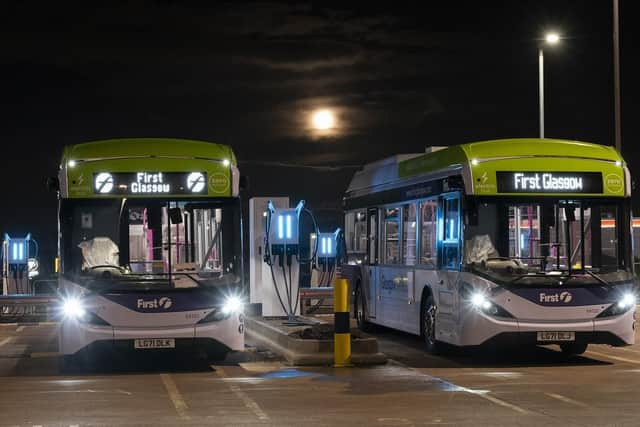Glasgow councillor calls on governments to help fund bus franchising plans
and live on Freeview channel 276
Strathclyde Partnership for Transport (SPT) took the first step towards returning the city’s buses to public control earlier this month when it agreed to start work on the franchising proposal.
Rolling out bus franchising could allow SPT, or a similar body, to set routes and fares and contract bus operators to run them.
Advertisement
Hide AdAdvertisement
Hide AdNow, Cllr Malcolm Mitchell, SNP, is planning to bring a motion to a full council meeting on Thursday which calls for letters to be sent to both governments requesting financial support for the “franchising exploration process”.


It states exploring franchising is “likely to require very significant public investment”, with estimates that taking the process to implementation could be around £15m and take five to seven years.
Operating the scheme could need an extra £45m to £85m in public subsidy each year.
Bus firm McGill’s has previously threatened legal action over franchising, which it described as “theft of private business”. In response to Cllr Mitchell’s call, Ralph Roberts, CEO of McGill’s, said it is “essentially a call to run up a huge bill so councillors don’t have to make difficult decisions that will prove unpopular with motorists”.
Advertisement
Hide AdAdvertisement
Hide AdSPT approved a recommendation to start work on franchising as there are “significant concerns in terms of the efficiency, affordability and overall sustainability of the bus network in Strathclyde”.
Cllr Mitchell’s motion, which is set to be seconded by the city’s transport convener, Cllr Angus Millar, asks councillors to agree that “the legacy of deregulation and privatisation of Glasgow’s bus network” has “coincided with a steady erosion of bus patronage in recent decades”.
He adds that greater public control could “deliver opportunities to enhance the multi-modal integration of Glasgow’s public transport network, including through alignment with a new Clyde Metro scheme”.
The motion also states there is “cross-party support for exploring franchising, with 83 out of 85 councillors at the Glasgow City Council elections in 2022 being elected on manifesto commitments to explore greater public control of Glasgow’s bus network”.
Advertisement
Hide AdAdvertisement
Hide AdIt notes it is important that councils and SPT continue to work “in partnership with bus operators to secure improvements to Glasgow’s bus network in the here and now”.
Mr Roberts said: “In our discussions with the then transport minister Humza Yousaf, when the Transport Act that permitted franchising was being formed, he was very clear that if local authorities want to use these powers, they would have to fund the money in their own budgets and central government would not be footing the bill.”
He added the first step towards better buses is “to fix the roads and give buses more road space”. “Clearing the main arteries of parking is the easiest and cheapest way to do this — it costs only paint so what is the delay?
“That is the dilemma for councillors: doing it correctly — and cheaply — will upset car owners. So, they want someone else to foot the bill to do it expensively and very inefficiently.”
Advertisement
Hide AdAdvertisement
Hide AdMr Roberts added: “Car users of Glasgow, who are unhappy with evening parking charges, will just end up footing this bill in a different way to pay for these plans.
“Meanwhile, anyone who is even remotely involved in public transport knows that privatisation (deregulation) of the buses slowed down the footfall decline – and that the 1986 Act actually worked – something we would urge Cllr Mitchell to take note of.
“What didn’t work was that local authorities then generally washed their hands of bus responsibility and were mostly unwilling to help buses.
“The next time voters hear Glasgow City Council say that they want “a world-class bus network”, please tell them to firstly put world-class roads and public transport infrastructure into place.”
Comment Guidelines
National World encourages reader discussion on our stories. User feedback, insights and back-and-forth exchanges add a rich layer of context to reporting. Please review our Community Guidelines before commenting.